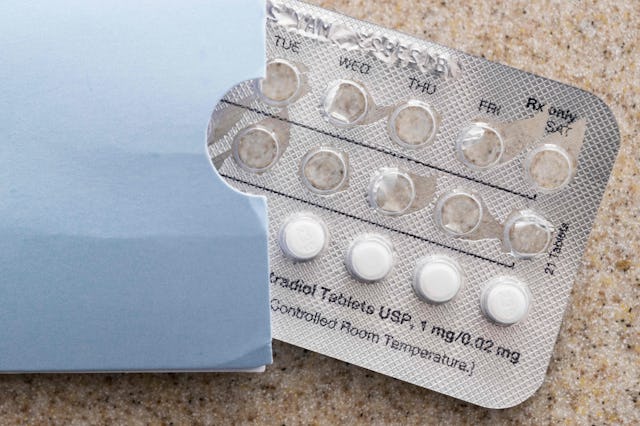Drugmaker Seeks FDA Approval For Over-The-Counter Birth Control Pill
The possibility of easier birth control access comes at a critical moment for reproductive healthcare in the U.S.

Imagine if you could run out quickly to the drugstore at any hour of the day and buy a new pack of birth control pills without having to bother calling your doctor's office for a new prescription or your pharmacist for a refill. It would be one less hassle of having being born with female reproductive organs, right? And with access to reproductive healthcare suddenly curtailed in many states by the Supreme Court's ruling overturning Roe v. Wade, the timing couldn't be better.
French company HRA Pharma has submitted an application for FDA approval for its over-the-counter birth control pill. Currently available via prescription as Opill, a non-estrogen contraception pill or "mini pill," it was first approved in the U.S. in 1973.
FDA approval for the drug over the counter is expected in the first half of 2023.
“We’re very proud of being the first company to submit the first-ever application to the FDA for daily birth control over the counter,” said Frédérique Welgryn, the company's chief strategic operations and innovation officer, according to Time.
The timing, however, was coincidental. "We have been working on that application for the last seven years," Welgryn explained, as reported by Reuters.
Hormonal contraception is available over the counter in a hundred other countries, according to the American Academy of Family Physicians, which also highlights the fact that an estimated 50% of pregnancies occurring in the U.S. annually are unplanned. The AAFP is one of a number of professional organizations that supports making hormonal contraception available over the counter in the U.S.
A 2016 study found that among U.S. women who attempted to get a prescription for hormonal contraception, 29% faced difficulties obtaining a prescription or refills.
The American College of Obstetricians and Gynecologists also supports making over-the-counter hormonal contraception available without age restrictions as a way to overcome barriers to access. "Several studies have demonstrated that women are capable of using self-screening tools to determine their eligibility for hormonal contraceptive use," says the organization, adding that such contraceptives are safe and effective. While prescription access to birth control is currently necessary, "over-the-counter access to hormonal contraception should be the ultimate goal."
It's important to note that emergency contraception — levonorgestrel, sold as Plan B and other brand names — has been available over the counter to people of all ages since 2013. It's a pill you take within 72 hours, ideally ASAP, after unprotected sex that prevents a pregnancy from occurring. You can dash out to the store for this one, and also keep a dose at home in your medicine cabinet, just in case, but it isn’t meant for regular use like many other forms of hormonal contraception.